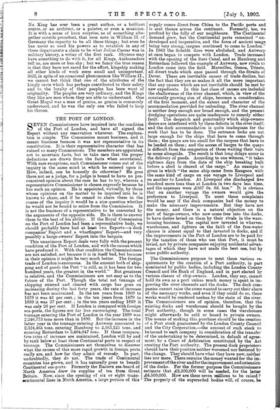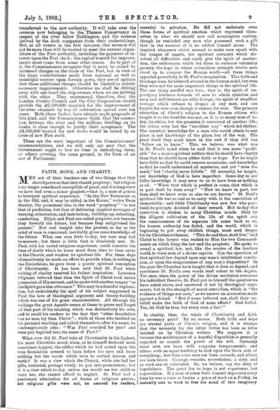THE PORT OF LONDON.
Q EVEN Commissioners have inquired into the condition of the Port of London, and have all signed the Report without• any reservation whatever. The explana- tion is simple. The Commission meant business, and it meant business because it was not representative in its constitution. It is their representative character that has ruined so many Commissions. The members are appointed, not to ascertain facts, but to take care that the proper deductions are drawn from the facts when ascertained. With rare exceptions, each Commissioner comes out of the inquiry in the same mind in which he entered upon it. How, indeed, can he honestly do otherwise ? He goes there not as a judge, for a judge is bound to have no pre- conceived opinion about the case he has to try, whereas a representative Commissioner is chosen expressly because he has such an opinion. He is appointed, virtually, by those whose opinions on the matter to be inquired into he is known to share, and. if he ceased to share them in the course of the inquiry it would be a nice question whether he would not be bound to retire from the Commission. It is not the business of a representative to be converted by the arguments of the opposite side. He is there to answer them to the best of his ability. If the Royal Commission on the Port of London had been a representative body, we should probably have had at least two Reports—a dock companies' Report and a wharfin,gers' Report—and very possibly a barge-owners' Report into the bargain.
This unanimous Report deals very fully with the present condition of the Port of London, and with the causes which have produced it. With that condition the Commissioners are not satisfied, not because it is in itself bad, but because in their opinion it might be very much better. The foreign trade of London is enormous. In the amount both of ship- ping and of goods the Port "is still, as it has been for two hundred years, the greatest in the world." But greatness is relative, and the Commissioners are not easy as to the future of the Port. Though the total net tonnage of shipping entered and cleared with cargo has gone on increasing during the last forty years, the rate of increase has not been maintained. In the ten years from 1869 to 1879 it was 43 per cent. ; in the ten years from 1879 to 1889 it was 37 per cent. ; in the ten years ending 1899 it was only 26 per cent. If London is compared with foreign sea-ports, the figures are far less encouraging. The total tonnage entering the Port of London in the year 1899 was 2,246,773 tons more than in 1890. But the increase in the latter year in the tonnage entering Antwerp amounted to 2,324,465 tons, entering Hamburg to 2,563,125 tons, and entering Rotterdam to 3,404,647 tons. If these compara- tive rates of increase are maintained, London will by and by rank below at least three Continental ports in respect of tonnage. The Commissioners set themselves to discover what the causes of this more rapid growth in foreign ports really are, and how fax they admit of remedy. In part, undoubtedly, they do not. The trade of Continental countries has grown, and it has naturally gone to benefit Continental sea-ports. Formerly the Eastern sea-board of North America drew its supplies of tea from Great Britain. Now, since the opening of six or eight trans- sentinental lines in North America, a large portion of this supply comes direct from China to the Pacific ports and is sent thence across the continent. Formerly, too, we profited by the folly of our neighbours. The Continental demand grew, but the Continental ports remained "un- developed and inoperative, and the force of ancient usage being very strong, cargoes continued to come to London." In 1863 the Scheldt dues were abolished, and Antwerp at once began to compete with London. Trade increased with the opening of the Suez Canal, and as Hamburg and Rotterdam followed the example of Antwerp, new rivals to London came into the field. Marseilles, Genoa, Trieste, all divert trade which once passed through the Straits of Dover. These are inevitable causes of trade decline, but the fact that they are so makes it all the more important that any causes which are not inevitable should be met by new expedients. In this last class of causes are included the shallowness of the river channel, which, in view of the constantly growing size of ships, becomes a consideration of the first moment, and the extent and character of the accommodation provided for unloading. The river char nel is neither deep enough nor broad enough, and the present dredging operations are quite inadequate to remedy either fault. The despatch and punctuality which ship-owners desire are interfered with by these defects in the river itself, and the dock accommodation is quite inadequate for the work that has to be done. The entrance locks are not large enough for the ships that have to come through them; the quays are too small for the cargoes that have to be landed on them ; and the access of barges to the quays is difficult from the congestion of those waiting their _turn to come alongside. The result is that long delays occur in the delivery of goods. According to one witness, "it takes eighteen days from the date of the ship breaking bulk before a shed is cleared of the cargo." An example is given in which "the same ship came from Rangoon with the same kind of cargo on one voyage to Liverpool and on another to London. At Liverpool she discharged five hundred more tons than at London in two days less time, and the expenses were .2367 Os. 6d. less." It is obvious that on another voyage the owners would give the preference to Liverpool. To meet these complaints would be easy if the dock companies had the money to make the necessary improvements. But they have not the money, and there is a natural objection on the part of barge-owners, who now come free into the docks, to have duties levied on them by their rivals in the ware- housing business. The capital now invested in wharves, warehouses, and lighters on the faith of the free-water clauses is almost equal to that invested in docks, and if the improvements in the Port of London are to be paid. for by the taxation of those who use that Port, it must be levied, not by private companies enjoying accidental advan- tages of which they have not made the best use, but by some public authority.
The Commissioners propose to meet these various re- quirements by the creation of a Port authority, in part nominated by public bodies, including the London County Council and the Bank of England. and in part elected by various, classes of ship-owners. London, they say, cannot hold its own as a port unless much money is spent in im- proving the river channels and the docks. The dock com- panies cannot raise the sums wanted to carry out their share of the necessary works, and even if they could do so, these works would be rendered useless by the state of the river. The Commissioners are of opinion, therefore, that the existing docks and warehouses should be bought by the Port authority, though in some cases the warehouses might afterwards be sold or leased to private owners. The means of making this purchase should be the creation of a Port stock guaranteed by the London County Council and the City Corporation,—the amount of such stock to be issued to each company in consideration of the transfer of the undertaking to be determined, in default of agree- ment, by a Court of Arbitration constituted by the Act creating the Port authority. The present dock proprietors should have their position neither worsened nor bettered by the change. They should have what they have now, neither less nor more. There remains the money wanted for the im- provement of the river and forthe improvement and extension of the docks. For the former purpose the Commissioners estimate that £2,500,000 will be needed, for the latter £4,500,000. How are these seven millions to be raised ? The property of the superseded bodies will, of course, be
transferred to the new authority. It will take over the revenue now belonging to the Thames Conservancy in respect of the river below Teddington, and the revenue derived by the dock companies from their undertakings. But, at all events in the first instance, this revenue will • not be more than will be wanted to meet the current expen- diture of the Port authority, including the payment of in- terest upon the Port sto3k ; the capital wanted for improve- ments must come from some other source. As to part of it, the Commissioners recognise that it must be raised by increased charges on the trade of the Port, but in view of the large contributions made from national as well as municipal sources upon foreign ports, they are of opinion that these additional charges should be limited to strictly necessary improvements. Otherwise we shall be driving away with one hand the ship-owners whom we are inviting with the other. They recommend, therefore, that the London County Council and the City Corporation should provide the £2,500,000 required for the improvement of the river channels by way of subvention spread over ten Years. Both these bodies have already made proposals of this kind, and the Commissioners think that the connec- tion between the river and the millions dwelling on its banks is close enough to justify their acceptance. The X4,500,000 wanted for new docks would be raised by an issue of new Port stock.
These are the most important of the Commissioners' recommendations, and we will only say now that the Government ought to lose no time in embodying them, or others covering the same ground, in the form of an Act of Parliament.















































 Previous page
Previous page